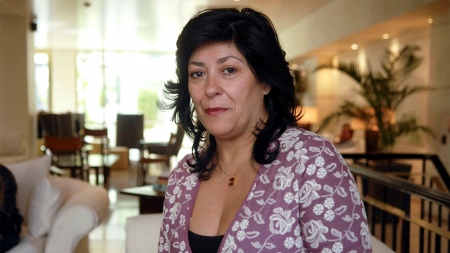Between the duel, the possibilities of expanding the meaning that poetry gives and the wink accomplice to a relationship that was loving but also literarythe essayist, critic and director of the Instituto Cervantes Luis García Montero brought together in “One year and three months” a series of poems to honor, remember and bid farewell to his partner, the popular and well-known Spanish writer Almudena Grandes.
With poems that commemorate illness and loneliness but also the complicity and their long love story, “One year and three months” (edited by Tusquets and which refers to the time of the illness) is a short collection of poems, only 60 pages long, loaded with reading keys and references in which the reader can follow García Montero through the sorrows of mourning and in the memory of a shared life.
The book also bears witness to a habit that they maintained during the thirty years in which they were a couple: dedicating texts to each other beyond formality, with formulas and intricacies that revealed the type of bond – loving, but also literary – that they maintained. .
“The final judgment for us / is to know if it is worse / the fate of the one who dies or of the one who remains / here with no more meaning than nothing / One of the two dead must continue standing”, warns one of García Montero’s poems , who when writing also chooses how to continue standing.
The poet He started writing about his wife’s illness as soon as they got the news in September 2020. Even in “It can’t be like that”, published in 2021, there is one of those poems. During the days of hospitalization and care, she addressed the relationship with cancer, resistance and hope. But after his death, which occurred on November 27, 2021, García Montero moved to the broad spectrum of the memory of those last days that he, paradoxically, does not hesitate to consider “the happiest” in life. of the. “At that time, life was resolved in care, in capacity and in the awareness that what really unites us is our weakness. And that there is no love without weakness because love is care”, told in September during the presentation of the book in Seville.
He handed it over to Tusquets, the publisher in which Grandes entrusted all his work, when He recognized in the collection of poems a tone of calm and meditation that prevailed over the relief.
In May, during his visit to the Buenos Aires Book Fair to pay homage to the writer, he previewed one of the poems in the book that is only now reaching Buenos Aires bookstores, “Lectores”. She recounted, by way of introduction, that she was inspired by her late-night reading habits.

“She read until three in the morning. I fell asleep quickly but woke up in the middle of the night and turned on the light to read. It didn’t bother either of us,” he said and went on to the poem: “It’s also love a negotiated light / We are nocturnal ships that anchor in this room / next to a bed that looks like a port. / I don’t care how long it takes you to turn off the light / if I fall asleep while reading.”
García Montero, who describes death as “a domestic animal that scratches you and lives with you on a daily basis”, believes that he ultimately took on this latest literary venture as a form of “make sense of a world that had become completely meaningless.
They met in the early 90’s. both were married. The crush was immediate, so after a time in hiding, they separated from their respective partners. They shared the home with Irene and Mauro, his and her children, and with the one they had together, Elisa.
“It’s very difficult to fall in love with someone you don’t admire. I’m not just talking about literary admiration, but in general for what Luis does and embodies. Let’s say that literary admiration was a bridgehead for everything that happened later,” she said. during an interview with Clarín when remembering those first days. For Luis, on the other hand, it was different: “I first met her as a woman and then I read her. I really liked her as a woman and that led me to read her.” However, she accepted that admiration played her part in the charm: “It is very difficult for a relationship between writers to deepen without that dose of admiration.”
Parallel to their literary careersthey grew up like leftist militants and republican tradition and they held a strong social commitment. He, a fan of Real Madrid, and she of Atlético, shared hours of readings and corrections, a dynamic that allowed them to also experience literature indoors and that explains that kind of secret and coded dialogue that exists between the work of one and the other.
During the funeral of the author of “El corazón helado”, the writer decided to leave at the foot of his grave the poems “Fully Friday” (1998), a demonstration of love thatluda to the day of the week that they were in Granada or Madrid when they were just beginning to know each other, and also a nod to the novel “I’ll call you Friday” (1991) by Grandes, which was far from the success of “The Ages of Lulú”.
“Atlas of human geography” was the first book that Grandes dedicated to him: “To Luis, who came into my life and changed the plot of this novel. And the plot of my life.” And, from there, he dedicated them all to him, slightly varying the formula: “To Luis. Again, and there will never be enough of them.” He also dedicated her poems to her. The first was “Completely Friday”: “To Almudena, also in the light of winters.” But also “To Almudena. As I have always lived with my feet in the clouds, I need love to put my hands on the ground”; “To Almudena, the only homeland of the pilgrim”; “To Almudena, next to the tree, because the moment we opened our eyes we saw the naked world” or “To Almudena, who shelters me with a look of my silences and defends me with a smile of my words”.
The disease also made that admiration that was lavished and confirmed in the dedications became absolute confidence at the time of writing. Grandes’ posthumous novel, “Everything is going to get better”, was closed by García Montero, who, guided by her indications and reflections, typed the ending. It is a dystopian work in which Spain is transformed into an ultra-capitalist dictatorship run by large companies, and which the author wrote between chemotherapy sessions as a routine that she gave herself for her 60th birthday and that allowed her to maintain a certain integrity during chemotherapy treatment. “We read the notebook entries together, talked about the possibilities, and she asked me to write what was going to remain unfinished. She wanted her readers to know the end of the story that she had envisioned. That’s what I’ve tried to do in the last and brief chapter of this book. I have not pretended, of course, to be at Almudena’s narrative level, but to write, as she wanted, a few pages that followed her instructions. I hope I have not betrayed the love she felt for her readers, her readers and her characters”, he recounted in the epilogue of that novel that, at her request, was encouraged to close for the readers, of both.
















